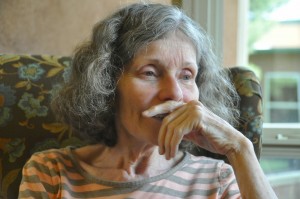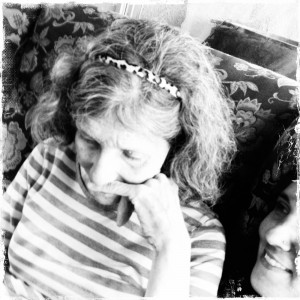Funny Faces, Favorite Songs – could she tell it was me behind the tears?
November 25, 2015Guest Blogger Melissa Smith
Once buzzed in, I walked past the fish tank on the left when an unusually foul smell assaulted me from the bathroom tucked to the right of the corridor and revealed a half naked woman wrestling with a caregiver.
I moved quickly through the next room where Audrey Hepburn and Humphrey Bogart were talking flirtively in black and white. Passed a silver haired shrunken woman in a blue top shuffling by while wringing her hands and stopped short as I turned the next corner and caught glimpse of her.

Seated in a simple striped shirt and usual smart jeans that gaped from her recent weight loss, she gazed out the window with her now dulled blue-brown speckled eyes. She didn’t move to look at me as I sat down.
I reached for her hand tentatively. Would she be upset by the unfamiliar touch?
‘Hi Marcee,’ I said.
We sat for a while, and I tried hard to get her to laugh or even look at me. I performed silly faces and talked out loud to her in what she must have interpreted as gibberish. It felt like chattering to someone who’s ignoring you, only I knew she simply wasn’t comprehending. Anything.
A heavy emptiness fell between us.
In desperation to connect, I reached to rub her shoulder as my dad suggested that she seemed to respond to his touch. Hopeful she’d acknowledge mine, too. She didn’t seem to notice.
Curious if she would sing along, I played the entire album from Diana Krall’s greatest hits, one of her favorite jazz singers. My hopes were raised with a few fleeting moments of humming and the tapping of her foot to the beat.
Peel me a grape, a song that used to make me giggle when I was younger, came on. Smiling through pooling tears, I leaned over and said, ‘I sure love you.’

Suddenly her words, which up to this point were incoherent, were as clear as the song itself. ‘You do?’ she asked.
I managed to whisper, ‘Yes. Yes, I do.’
***
Alzheimer’s is an insidious disease that slowly unravels the mind and the self. It shakes families to the core, and forces them to adapt in smart and meaningful ways. These four short documentary films explore that process. I recently watched A Place Called Pluto and was reminded of my step mother, Marcee’s early stages of Alzheimer’s. How she knew she had the disease, and yet couldn’t quite articulate it as well as award-winning journalist Greg O’Brien can. She is now in the last stages of Alzheimer’s. Everyone is unrecognizable to her, and she is completely incontinent and in need of help to eat.
Reading O’Brien’s story is like diving into what must have been her thoughts, her fears, and her rage when this journey first began. The curse and the blessing of this is: she is a shell of a body with so little of her once vivacious personality left, and yet she no longer knows she has the disease.
For the caregivers, for my father… my heart aches. For the ones embodying this disease, I simply pray the quality of life left will be full of dignity and ease.
